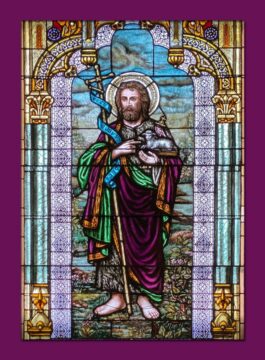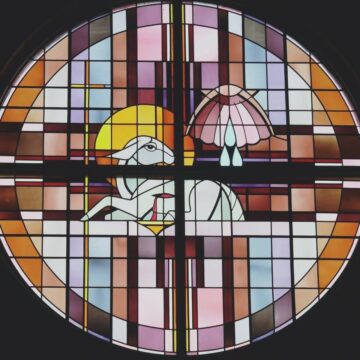Franciscan Friar Fr. Paul Gallagher reflects on the Second Sunday of Ordinary Time. In the last verse of the Gospel text, John the Baptist states that he testifies to what he has experienced and seen. What is your experience of God working in your life?
 The content is edited by Franciscan Sister of Christian Charity Sister Anne Marie Lom and Joe Thiel. The excerpts from the Sunday readings are prepared by Joe Thiel. To read or download the complete pdf with excerpts for your prayer, please click here Franciscan Gospel Reflection January 15 2023. Excerpts are from the Lectionary for Mass for Use in the Dioceses of the United States of America, second typical edition © 2001, 1998, 1997, 1986, 1970 Confraternity of Christian Doctrine, Inc., Washington, DC. Used with permission. All rights reserved. No portion of this text may be reproduced by any means without permission in writing from the copyright owner.
The content is edited by Franciscan Sister of Christian Charity Sister Anne Marie Lom and Joe Thiel. The excerpts from the Sunday readings are prepared by Joe Thiel. To read or download the complete pdf with excerpts for your prayer, please click here Franciscan Gospel Reflection January 15 2023. Excerpts are from the Lectionary for Mass for Use in the Dioceses of the United States of America, second typical edition © 2001, 1998, 1997, 1986, 1970 Confraternity of Christian Doctrine, Inc., Washington, DC. Used with permission. All rights reserved. No portion of this text may be reproduced by any means without permission in writing from the copyright owner.
Photo: St. John the Baptist from Sacred Hearts of Jesus and Mary, Sun Prairie, Wisconsin. Paster Father Thomas Kelley says: “This parish has a rich history that flows like a stream through time toward eternity which we simply step into.” You will want to visit.
Photo of the Lamb of God: St. John the Baptist Parish, Plymouth, Wisconsin The Parish has a long history as a vibrant Catholic community in Plymouth, Wisconsin. Current pastor is Fr. Philip Reigenberg. Franciscan Sisters of Christian Charity are proud to be part of this parish’s past and now its future.
John 1:29-34
 The next day John the Baptist saw Jesus coming toward him and said, “Behold, the Lamb of God, who takes away the sin of the world. He is the one of whom I said, ‘A man is coming after me who ranks ahead of me because he existed before me.’ I did not know him, but the reason why I came baptizing with water was that he might be made known to Israel.” John testified further, saying, “I saw the Spirit come down like a dove from the sky and remain upon him. I did not know him, but the one who sent me to baptize with water told me, ‘On whomever you see the Spirit come down and remain, he is the one who will baptize with the Holy Spirit.’ Now I have seen and testified that he is the Son of God.”
The next day John the Baptist saw Jesus coming toward him and said, “Behold, the Lamb of God, who takes away the sin of the world. He is the one of whom I said, ‘A man is coming after me who ranks ahead of me because he existed before me.’ I did not know him, but the reason why I came baptizing with water was that he might be made known to Israel.” John testified further, saying, “I saw the Spirit come down like a dove from the sky and remain upon him. I did not know him, but the one who sent me to baptize with water told me, ‘On whomever you see the Spirit come down and remain, he is the one who will baptize with the Holy Spirit.’ Now I have seen and testified that he is the Son of God.”
Background:
This Sunday the Church moves from celebrating the Epiphany and the close of the Christmas Season to the Second Sunday of Ordinary Time. The shift is also from the infant child Jesus who is being cared for to the adult Jesus who takes up his ministry. The Church marks this shift by selecting this Gospel text from John’s Gospel.
Directly preceding this text, the Jewish authorities have come to John the Baptist asking why he was prophesying concerning the coming of Jesus. The Gospel text begins, “The very next day.” While the Gospel does not actually describe the baptism of Jesus, it is the Baptist’s testimony to Jesus’ baptism and to its significance—that it is a clear and trustworthy sign that Jesus is the long-awaited Messiah. The text portrays John the Baptist as an eyewitness to the descent of the Spirit upon Jesus, and John saying that the spirit of God told him that when those things happen, it is a sign from God that this person is the one who will baptize with the Holy Spirit.
People of the day brought their disputes to the elders of the community. Those on either side of the dispute would bring their “witnesses” who would, with great passion, present reasons for supporting the side of the person they favored. The side with the strongest witnesses in terms of number, status, and passionate arguments usually carried the argument. John uses this familiar practice in the way he has composed his Gospel. The witnesses he calls upon throughout his Gospel are John the Baptist, Jesus’ own works, the Hebrew Scriptures, and God.
In today’s Gospel John the Baptist is the key witness. His testimony is important on two levels. He is known as a person who speaks the truth no matter what the cost. By the time John wrote his Gospel, the death of John the Baptist at the hands of Herod would have been known. He is also known as one who abandoned the temple ministry of this father Zechariah to go out into the desert to preach repentance in preparation for the coming of the Messiah.
There were those who wondered if John himself might be the messiah. Earlier in the Gospel John describes the Baptist this way: “A man named John was sent from God. He came for testimony, to testify to the light, so that all might believe through him. He was not the light, but came to testify to the light.” (John 1:5-8) The Gospel indicates that a great many people came out to be baptized by John. Those opposed to the idea of Jesus as the Messiah, the scribes and Pharisees, also opposed the Baptist and questioned his authority to baptize.
In the verses that precede this text, the evangelist reminds his community of this fact. “When the Jews from Jerusalem sent priests and Levites (to him) to ask him, ‘Who are you?’ he admitted and did not deny it, but admitted, ‘I am not the Messiah.’ So they asked him, ‘What are you then? Are you Elijah?’ And he said, ‘I am not.’ ‘Are you the Prophet?’ He answered, ‘No.’ So they said to him, ‘Who are you, so we can give an answer to those who sent us? What do you have to say for yourself?’ He said: ‘I am “the voice of one crying out in the desert, ‘Make straight the way of the Lord,’ as Isaiah the prophet said.”’ Some Pharisees were also sent to John the Baptist. They asked him, ‘Why then do you baptize if you are not the Messiah or Elijah or the Prophet?’ John answered them, ‘I baptize with water; but there is one among you whom you do not recognize, the one who is coming after me, whose sandal strap I am not worthy to untie.’” (John 1:19-27) John the Baptist is a respected and powerful witness to the claim that he is making for Jesus as the Messiah.
 Reflection Questions:
Reflection Questions:
- What do you know about John the Baptist? From what you know, do you think he is a reliable witness?
- John admits twice in the text, “I did not know him.” How do you understand his statement?
- John also publicly acknowledges that Jesus is the more significant person, and calls him the Lamb of God, and at the end of the text he calls him the Son of God. Does John’s understanding of himself, his cousin, and his role in scripture shed light on the journey of understanding one’s relationship to God or Jesus?
- How is the journey of self-discovery before God taking place in your life right now?
- In the last verse of the Gospel text, John the Baptist states that he testifies to what he has experienced and seen. What is your experience of God working in your life?
- Can you take some time now to talk with God honestly about your impression of John the Baptist, the testimony he has given here to the importance of Jesus, or perhaps your own understanding of your role of pointing to the presence of God in your world?



Article Comments:
Sister Anne Marie Lom 01/14/2023 @ 6:10 pm
How have I experienced God working in my life? So many times something happens, ideas converge, people meet and share, someone is healed of a painful memory, something that I could never have orchestrated, or even imagined. Then I know God is there, working, inspiring, initiating. God is always at work, we just need to pay attention!